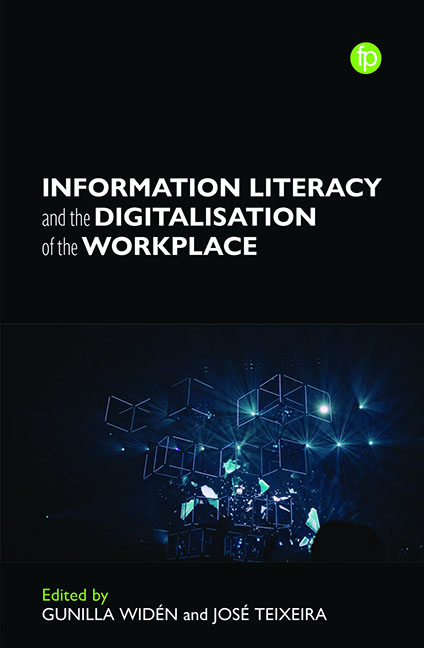Book contents
- Frontmatter
- Contents
- Figures and Tables
- Contributors
- Introduction: Advancing Theory on Workplace Information Literacy
- 1 Literature Review: In Search of the Many Meanings of Information Literacy
- 2 Digital Literacy in a Post-Digital Era: Rethinking ‘Literacy’ as Sociomaterial Practice
- 3 Methodological Choices of Information Literacy in the Workplace: Qualitative, Quantitative or Mixed-Methods?
- 4 Investigating Information Seeking and Information Sharing Using Digital Trace Data
- 5 Making Do With Limited Transparency of Sensitive Information in Secretive Organisations: Collective Information Literacy Through Hinting
- 6 Information Literacy Competencies for Career Transitions in the Digital Age
- 7 The Importance of Information Literacy for Work Satisfaction in a World-Wide-Workplace Context
- 8 Entrepreneurs’ Digital Information Sources Selection: A Perspective on the Impact of Information Literacy and Generational Differences
- 9 Conclusion: Workplace Information Literacy as the Literacy of the Digital Workplace
- Index
8 - Entrepreneurs’ Digital Information Sources Selection: A Perspective on the Impact of Information Literacy and Generational Differences
Published online by Cambridge University Press: 17 December 2023
- Frontmatter
- Contents
- Figures and Tables
- Contributors
- Introduction: Advancing Theory on Workplace Information Literacy
- 1 Literature Review: In Search of the Many Meanings of Information Literacy
- 2 Digital Literacy in a Post-Digital Era: Rethinking ‘Literacy’ as Sociomaterial Practice
- 3 Methodological Choices of Information Literacy in the Workplace: Qualitative, Quantitative or Mixed-Methods?
- 4 Investigating Information Seeking and Information Sharing Using Digital Trace Data
- 5 Making Do With Limited Transparency of Sensitive Information in Secretive Organisations: Collective Information Literacy Through Hinting
- 6 Information Literacy Competencies for Career Transitions in the Digital Age
- 7 The Importance of Information Literacy for Work Satisfaction in a World-Wide-Workplace Context
- 8 Entrepreneurs’ Digital Information Sources Selection: A Perspective on the Impact of Information Literacy and Generational Differences
- 9 Conclusion: Workplace Information Literacy as the Literacy of the Digital Workplace
- Index
Summary
Introduction
The emergence of digitalisation has transformed the ways entrepreneurs seek and acquire information from available digital information sources. The vast amount of digital information sources offers unprecedented opportunities to entrepreneurs and small- and medium-sized enterprises (SMEs) to enhance their business performance. However, acknowledging the benefits that digital information sources provide, especially in terms of quality and accessibility, entrepreneurs should develop their literacy skills, such as information literacy (IL hereinafter). In an information-based society, IL is defined as the necessary skills and competencies to find, handle and use information and individuals are required to acquire such skills. Some authors argue that IL is the most important literacy in our contemporary society as it enables us to achieve both personal and professional goals, as well as supporting economic development (Virkus, 2011). Besides IL, social norms, ‘the influence of peers’ (Brännback et al., 2018) and types of tasks may also affect entrepreneurs’ perception of digital information sources and, in turn, their digital information sources selection (Nikou et al., 2020). Moreover, the continuous expansion of digitalisation has been associated with a substantial reduction of entry barriers for entrepreneurs, in particular, access to critical business information (Kristiansen, Furuholt and Wahid, 2003).
For example, digitalisation enables and improves entrepreneurs’ access to information through digital information sources, such as social media and web-based platforms (Guan et al., 2017; Jansen, van de Wijngaert and Pieterson, 2010; Orrensalo and Nikou, 2021a). The use of digital information sources (Ivanytska et al., 2021), reduces the cost of infrastructure, time constraints and human labour (Dinet, 2014). Information acquired from digital sources allows entrepreneurs to reach relevant, accurate and timely information for their business needs (Chatterjee, Dutta Gupta and Upadhyay, 2020), which leads to an increase in entrepreneurs’ understanding of the market environments that support their activities, decision-making process and the business growth and outcome (Sahut, Iandoli and Teulon, 2021). Although literature has shown the benefits of digital information sources for entrepreneurial activities to compete in high pressure and dynamic environments (Sahut, Iandoli and Teulon, 2021), current research does not present a comprehensive conceptual model that examines the entrepreneurs’ digital information sources selection. The selection of digital information sources may not happen in isolation but requires the identification of factors influencing such behaviour (for example, Zaremohzzabieh et al., 2016).
- Type
- Chapter
- Information
- Information Literacy and the Digitalisation of the Workplace , pp. 121 - 144Publisher: FacetPrint publication year: 2023

